
Sponsored Ads
|
Articles by this Author
»
(E) Croatian Youth Festival in New York
|
| | Distributed by CroatianWorld CroatianYouth Festival in New York 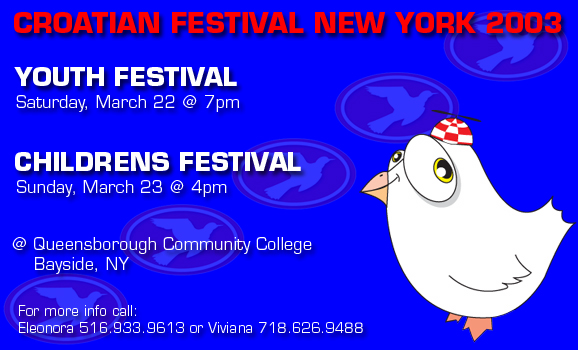
Weare excited to announce the first ever Croatian Youth Festival,
Saturday, March 22nd, 2003 and the 4th annual Croatian Children's
Festival, Sunday, March 23rd, 2003, both taking place at Queensborough
Community College in New York. The Croatian Youth Festival will feature
23 young adults between the ages of 14 and 21. The Croatian Children's
Festival will showcase 26 children between the ages of 5 and 13. The
young singers will be accompanied by over 100 Croatian children, of all
ages, that will take part in the spectacular choreographical ensemble.
All performerswill sing new songs composed by prominent musicians from
Croatia and the United States. Two winners will be selected fromeach
festival by the judges and the audience. They will be eligible to
perform their song at one of the famous Festivals in Croatia.
You are allinvited to enjoy an enchanted evening of Croatian music in
the heart of New York. On behalf of the Croatian Community, we
congratulate the previous winners and wish them continued success in the
future. We also wish this year's contestants all the best, good luck to
them all!
As you know,the plans for the festival are financially demanding. As
we coordinate these festivals we are counting on your understanding and
precious support which you have so kindly demonstrated in the past.
Your generous contribution will help in the production of a child's
song, each of which has a total cost of $1,200. Any size donation will
be greatly appreciated.
To show our thanks and appreciation for your donation of:
$1,000.00 or more will receive a GOLD CERTIFICATE
$ 600.00 to $ 999.00 SILVER CERTIFICATE
$ 300.00 to $ 599.00 BRONZE CERTIFICATE
The names of the sponsors and all donators will be printed in a
published souvenir book to commemorate this occasion. If you would like
to be a special sponsor of a child's song, please notify Father Robert
Zubovic by February 18th, 2003. These Gold Deluxe sponsors will have
their names published on the CD and videotape.
Your sponsorship will allow the children a chance to experience the
Croatian cultural arts. Music is in us and around us. Let us continue
the tradition of the Croatian Children's and Youth Festivals in New York
and make history.
Thank you for your consideration and understanding. We look forward to
seeing you in March at the Festivals.
With sincere thanks,
Eleonora Turcinovic
Father Robert Zubovic
Festival Director
Coordinator of Croatian Catholic Mission, Astoria, NY
(516) 933-9613
(718) 726-7937
Please make your check payable to: CROATIAN COMMUNITY OF ASTORIA
Please send to: THE CROATIAN COMMUNITY OF ASTORIA
P.O. Box 3216
Astoria, NY 11103-216
Your contribution is being donated to a non-profit organization and is
tax deductible to the full extent of the law.
For additional information about thisevent, you can also call:
Nada Bernic 516/747-2580 or Viviana Knapic 718/626-9488
|
»
(E) Vision of Tondal
|
| | Distributed by CroatianWorld
Vision of Tondal

The story of Tondal, where an unconscious man has
a journey where his soul leaves the body, was written in the 12th
century by the Irish monk Marcus. It spread across the face of Europe,
including a late Medieval version dedicated to Benedictine nuns
on the Dalmatian coast. This performance uses Gregorian, Beneventan,
and Glagolithic chant known in Medieval Dalmatia. Glagolitic liturgy
is in the vernacular Croatian-Slavonic, but follows the Roman
Catholic rite of mass.
These performances from the Holland Festival of Early Music at
Utrecht 2002 are by the Ensemble Dialogos directed by Katarina
Livljanic. They are supported in part by Radio Nederland and the
Royal Netherlands Embassy in Washington, D.C.
1). Invocation to Tondal: Gospodin, smiluj se/Kyrie eleison (Glagolitic).
Zac noge tvoje sada u tanci ne igraju.
2). The soul of the Knight Tondal descends into Hell:
Introit: Venite, benedicti patris mei (Beneventan).
Tractus: Qui habitat in adiutorio altissimi (Gregorian, from the
"Dubrovnik Missal" in the Bodelian Library, Oxford).
3). The Valley of Abomination:
Viruju u jedinoga boga/Credo (Glagolitic).
Gospodine, pomiluj/Kyrie eleison (Glagolitic).
4). Into the depths:
Gospin plac (Lament of the Virgin--Glagolitic).
5). Lucifer, lord of Hell:
O janjce bozji/Agnus Dei (Glagolitic).
6). The Golden Seats
[After Tondal has followed the angels into hell and walked the thin bridge
across the stinking chasm, he sees the golden throne, and wonders why he cannot sit]
Obrativ se Tondal za angelorum.
Citaje knjige Otkrivenja {Glagolitic--book of the Apocalypse}.
Dodji, duse presveti/Veni, sancte spiritus (Glagolitic).
7). The Knight's Soul returns to his body
[When Tondal awakens, he assumes he has been gone for years, only
to find all his adventures lasted less that one-millionth of a second]
Cuvsi toj; Salve Regina; I toj reksi vaze ga za ruku; Svet/Sanctus.
Acclamation: Exaudi Christe.
Millennium of Music
Music List 03-01
|
»
(E) Formae Lucisî or Forms of Light - Vladimir Pajkic
|
| | Distributed by CroatianWorld Vladimir Pajkic 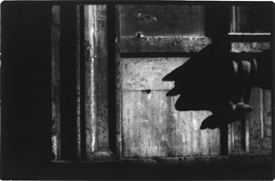
Photography CROATIAN ARTIST TO DISPLAY BLACK-AND-WHITE PHOTOGRAPHY AT CAPITOL HILL OPENING
Photographer/Architect Focuses on Light, Travel
What: Vladimir Pajkic Photography: Formae Lucisî
Where: RPM Capitol Hill, 225 Pennsylvania Ave., Washington, DC 20003
When: Friday, February 7th, 7-9 PM
Washington, D.C. -- Photographer and trained architect Vladimir Pajkic will
launch the first-ever public showing of his work called Formae Lucisî or
Forms of Light in Latin at RPM Capitol Hill on February 7th. Approximately
50 people are expected to attend a wine and cheese reception from 7-9 PM to
celebrate the opening and Pajkicís new website www.formaelucis.com. The
black-and-white photographs are all un-cropped so there is no editing of the
immediate experience of that very moment,î according to Pajkic (pronounced
pie-kitch). He uses a mixes media process to produce the images involving
both hand developing and elements of architectural printing.
Images range from graffiti on a door in the Jewish Ghetto in Rome to a group
of elderly playing cards in the streets of Shanghai.
"Most of my work was taken during my travels, but the place is almost
unimportant, " says Pajkic. "The theme is the exploration of light and the
cities, events, and people it captures. It ís almost a universal language."
Pajkic, who was born and raised in Croatia, earned a Bachelors of
Architecture at Cornell University and a Masters of Architecture from
Princeton University. He recently moved to Washington, D.C. where he is a
practicing architect.
Contact: Vladimir Pajkic
MEDIA ADVISORY
(202) 546-2842
vpajkic@alumni.princeton.edu
|
»
(E) Millennium of Music Schedule Feb2003 - The Klapa Tradition
|
The Klapa Tradition on Millennium of Music After the stunning response (best in the history of the show)given the Dalmatian singers from Hvar some weeks back, we are following up with music fromthe ancient secular tradition from Croatia featuring stunning male part-songs. February 24th / 24 Veljace 2003 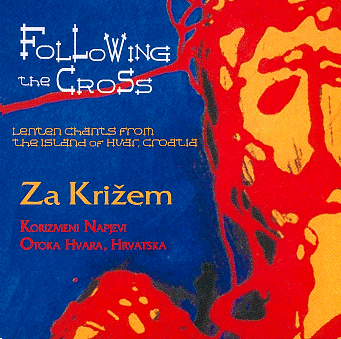 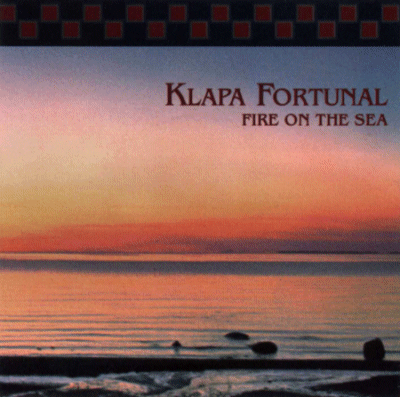
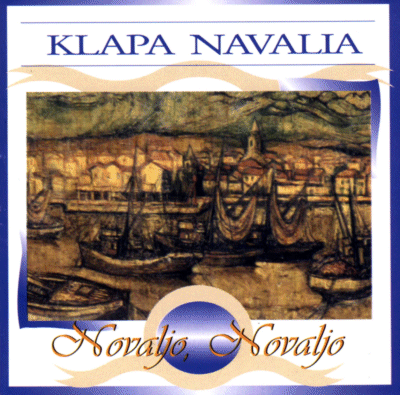
Op-ed This is a breakthrough for Croatian Music and Culture on the USAmarket.. Find your local stations that carries the show or log onInternet and find the way to hear it. let me know what have you find. Robert AubreyDavis, the host of the show will play all three CDs. Thank you Millennium of Music and Mr. Davis for recognizing a pearlof the world music heritage. Nenad Bach, producer of all three CDs
February 2003 Schedule
Program
February 24th / 24 Veljace 2003
#03-08: 2/24/03 The Klapa Tradition: After the stunning response given the Dalmatiansingers from Hvar some weeks back, we are following up with music from
the ancient secular tradition from Croatia featuring stunning male part-songs.
#03-05: 2/3/03 Palestrina from Denmark: Palestrina's death on Candlemas (February 2)has always made the month of February a good one to celebrate the great composer; this week, the Copenhagen Royal Chapel Choir takes us on
a musical tour of this Renaissance titan.
#03-06 : 2/10/03 Busnois and His Circle: A new recording by the Binchois Consorthighlights music from the 15th century lowlands--the great Antoine Busnois
(who died in Bruges), and two rarely-heard composers associated with the
Church of Our Lady in Antwerp, Petrus de Domarto and Jean Pullois.
#03-07: 2/17/03 "Il Fasolo" from Utrecht: This month's concert from the 2002
Holland Festival of Early Music presents a Roman/Neopolitan carnival
farce published in Venice through the mysterious Accademia degli incogniti
by one or more composers simply known as "Il Fasolo" ("the Bean").
#03-08: 2/24/03 The Klapa Tradition: After the stunning response given the Dalmatiansingers from Hvar some weeks back, we are following up with music from the ancient secular tradition from Croatia featuring stunning male part-songs.
|
»
(E) Millennium of Music
|
Millennium of Music 
Millennium of Music is an exploration into the sources and mainstreams of
European music for the thousand years before the birth of Bach. For over18
years, it has presented, in a quiet and serious way, the vast scope of
great music leading up to the early Baroque. It features the evolution of sacred
music, east and west, live performances by the best ensembles in the field
of early music, and the ever growing number of new releases in the field. 
Robert Aubry Davis is the creator and host of Millennium of Music. The program is based fromWETA-FM in Washington D.C. Davis also hosts European Centuries, co-hosts Songs for Aging Children with Martin Goldsmith and serves as moderator of WETA's TV Emmy-Award winning arts discussion program, Around Town. He also serves on the boards of Early Music America, and the Music Educator National Conference.
To broadcast Millennium of Music, we ask that you fill out a broadcast agreement. Why not use the one here?
If you have any questions about Millennium of Music or need further information please call Jennifer Hicks at (800) 491-8863.
Through the years we have featured such noted performers as; Anonymous
Four, The Clerks Group, Tallis Scholars, Jordi Saval, Hesperus and many others.
The best performers and conductors have shared their vision and creative
endeavors through this program. Since the beginning, chant has been a
mainstay of the listening experience, and many of the best-selling recordings
have received their premiere on Millennium of Music.
Each year, concerts are presented from the Holland Early Music Festival at
Utrecht and aired on Millennium of Music. If you want to know where you
can listen to us in your town, go to our website at
http://radman.org/about.htm and search our site. If you have anything you
would like to share with us, please email us at radman@weta.com or write us at
RADMAN Productions 2775
South Quincy Street Arlington, VA 22206.
We love to get letters and email from our listeners
Our one-hour national weekly program is heard on over 190 public radio
stations across the country. One of our goals is to help our listeners learn
about and obtain the recordings you hear on Millennium of Music. This is why
we are telling all of you about ClassicsToday.com. At ClassicsToday.com you
can read hundreds of reviews of Early Music recordings, as well as
hundreds of reviews of the latest classical recordings. http://www.wosu.org/home/fm/guide.html
------------------------------------------------------------------------
|
»
(E) Families NEEDED To Host High School Students From Croatia
|
| | Distributed by CroatianWorld FamiliesNEEDED To Host High School Students From Croatia Hostfamilies: Pacific Intercultural Exchange is looking for families to hosthigh school students from Korea, Germany, Thailand, Vietnam, Argentina, Croatia,Macedonia, Mexico, Hungary, Brazil, Armenia and Ukraine. Students are between 15and 18. The students are prescreened and speak English. For information aboutthe program, call 1 (800) 894-7633.
http://www.trivalleyherald.com/Sto ries/0,1413,86~10671~1174463,00.html
Oakland Tribune Tri-Valley Herald San Mateo County Times TheArgus Daily Review Marin Independent Journal Alameda Times-Star Vallejo Times-Herald
Snail Mail
401 13th Street
Oakland, CA 94612
Main Switchboard
(510) 208-6330
Patrick Perron - Online Editor
(510) 293-2733
pperron@insidebayarea.com
|
»
(E) Ivan Ljubicic - The weekend of his life Croatia Usa 4:1
|
| | Distributed by CroatianWorld The weekend of his life? (op-ed) Or Just a start!
Ljubicic almost singlehandedly dooms U.S. hopes
Posted: Sunday February 09, 2003 8:56 PM
ZAGREB, Croatia (AP) -- Ivan Ljubicic almost gave up playing Davis Cup six years ago.
The Americans wish he had.
Ljubicic and his Croatian teammates ousted the United States from the first-round of the Davis Cup on Sunday, thesecond time in three seasons that the Davis Cup's most successful nation has bowed out early.
Ljubicic, 23, won the deciding match when he defeated American No. 1 James Blake 6-3, 6-7 (5), 6-4, 6-3 to give Croatiaan insurmountable 3-1 lead. In the inconsequential second singles, Mario Ancic defeated Taylor Dent to give Croatia a4-1 victory.
The Americans still can't win without their top players. Pete Sampras and Andre Agassi have "retired" from Davis Cupand their No. 1 rising star Andy Roddick was absent this time with a wrist injury.
The United States has won more Davis Cups than anybody else, but not since 1995. Now it faces a playoff in Septemberto stay in the Davis Cup elite 16 and could face possible opponents like Thailand, India, Venezuela or Italy.
American captain Patrick McEnroe, who has not won an away match since taking over two years ago, praised Ljubicic.
"I think he had the weekend of his life," he said.
Ljubicic was overpowering, winning three "live rubber" matches against the United States to become only the ninthplayer in Davis history to do it.
He racked up 29 aces against Blake to go with 30 against Mardy Fish on Friday. He had 22 combining with GoranIvanisevic in doubles. Croatia will play in Spain in the quarterfinals. Neither Croatia nor the former Yugoslavia has everreached the Davis Cup final.
Ljubicic grew up as a Croatian living in neighboring Bosnia and fled his war-torn homeland in 1992. He learned some ofhis tennis when an Italian club brought the rising young star to Italy to escape the war and practice.
By 1997, he was good enough to be on Croatia's team playing a Davis Cup match in Finland. But he lost three straightmatches and felt so bad he almost gave up Davis Cup.
"I was as low as possible. I felt like I wasn't going to play Davis Cup anymore. The feeling at the time was: 'I don't needthis.'" He changed his mind. Blake had a few scattered chances against Ljubicic, but the Croatian's serve was too much on the fast indoor court. AndBlake was unable to control play from the baseline when there were rallies.
The match swung in the third set.
Blake broke serve in the third game, ending Ljubicic's run of 42 service games in the tie without a break. But Ljubicicbroke back in the eighth game, evening the set at 4-all.
Blake suddenly lost his concentration in the game and fell behind love-40, shouting out to a fan: "Put the sign down." Afan in the stands replied: "Go home James."
Blake was never the same after that. Ljubicic held serve in the next game, and then broke Blake to win the set.The final set was the most lopsided as a dispirited Blake was unable to hold off Ljubicic, who won the match when Blakenetted a forehand.
"That comeback in the third set I think was the key of the match," Ljubicic said. "He [Blake] slowed down a little bit,missed a couple of balls. I hit a great passing shot. It all happened very quick I didn't even have a chance to think aboutit."
Blake said Ljubicic's serve was too big. He also failed to convert the few chances he had.
"You don't get any rhythm on his serve, and on your serve you have to be so focused because you know he can hit fouraces the next game
|
»
(E) Janicia Kostelic, WORLD CHAMPION, wins combined gold
|
| | Distributed by CroatianWorld Janicia Kostelic, Champion of the World, WinsCombined Gold 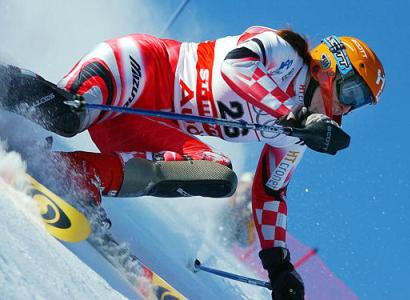
Croatia's Janica Kostelic skis to the gold medal in the Women'sCombined at the World Alpine Ski Championships in St. Moritz, Switzerland MondayFeb. 10, 2003. (AP Photo/Alessandro Trovati)
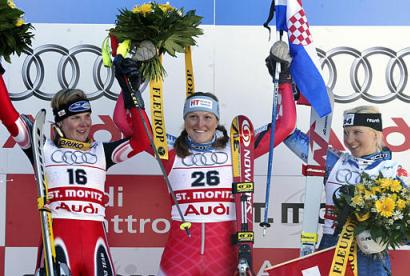
Croatia's gold medal winner Janica Kostelic, center, is flankedby Austria's Nicole Hosp, left, who took the silver, and Switzerland's MarliesOester, who took the bronze, during the flower ceremony for the Women's Combinedat the World Alpine Ski Championships in St. Moritz, Switzerland Monday Feb. 10,2003. (AP Photo/Rudi Blaha) 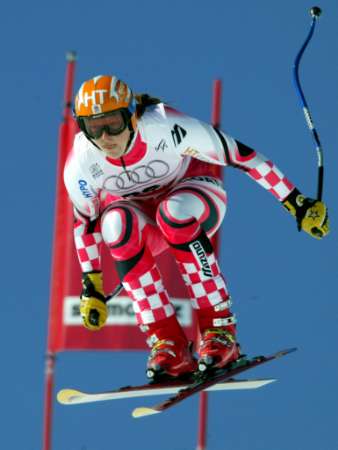
Janica Kostelic of Croatia in action during the downhill part ofthe women's combined event at the World Alpine Skiing Championships in St.Moritz, Switzerland, on February 10, 2003. Kostelic clocked the 12th fastesttime in the downhill in one minute, 18.81 seconds. REUTERS/Marcus Gyger FIS Alpine World Championships
Janicia Kostelic wins combined gold in duel with Austria's Nicole Hosp
St. Moritz, Switzerland
February 10, 2003
Nicole Hosp of Austria, just 19, picked up her first world championship medal, silver in the women's combined.
Reuters
Janica Kostelic of Croatia ripped through the second run of the women's combined slalom Monday at St. Moritz, Switzerland, to take the combined gold, her first world championship medal.
Kostelic, the overall World Cup leader, had the fastest second run by 0.11 seconds, and needed it to hold off Austrian teenager Nicole Hosp, who also won her first World Championship medal. she finished 0.06 seconds back. Hosp, 19, had been leading after the first run of slalom. The bronze medal went to Marlies Oester of Switzerland, 2.20 seconds out, giving the home team three medals in the last three events.
For the U.S. team, Julia Mancuso had the top finish, in seventh place. Another U.S. junior racer, Resi Stiegler, finished 10th in her World Championship debut. Caroline Lalive was 13th.
In 12th place after the combined downhill section, Kostelic moved through the field in the two slalom runs, much as the USA's Bode Miller had done en route to his gold in the men's combined, to clinch victory with a time of 2:41.63.
Kostelic, 21, who suffered a career-threatening knee injury in this Swiss resort in 1999, was hampered by pain from the same knee throughout the event and needed painkillers before the morning downhill. After her typically aggressive second slalom run, she clutched her knee in obvious discomfort.
FIS Alpine World Championships
Women's Combined
St. Moritz, Switzerland
Feb. 10, 2003
1. Janica Kostelic (Croatia) 2:41.63 (downhill 1:18.81/slalom first leg 41.52/ slalom second leg 41.30)
2. Nicole Hosp (Austria) 2:41.69 (1:18.25/41.91/41.53)
3. Marlies Oester (Switzerland) 2:43.83 (1:19.48/42.25/42.10)
4. Marlies Schild (Austria) 2:43.85 (1:19.83/42.61/41.41)
5. Maria Riesch (Germany) 2:44.60 (1:18.38/43.91/42.31)
6. Martina Ertl (Germany) 2:45.02 (1:20.15/42.27/42.60)
7. Julia Mancuso (U.S.) 2:45.30 (1:18.69/44.05/42.56)
8. Jessica Lindell-Vikarby (Sweden) 2:45.31 (1:18.18/44.62/42.51)
9. Sarka Zahrobska (Czech Republic) 2:45.51 (1:19.68/44.13/41.70)
10. Resi Stiegler (U.S.) 2:45.65 (1:19.93/43.96/41.76)
11. Emily Brydon (Canada) 2:45.84 (1:18.77/44.54/42.53)
12. Lea Dabic (Slovenia) 2:45.98 (1:18.73/44.61/42.64)
13. Caroline LaLive (U.S.) 2:46.70 (1:19.14/44.12/43.44)
14. Genevieve Simard (Canada) 2:46.82 (1:19.24/44.46/43.12)
15. Fraenzi Aufdenblatten (Switzerland) 2:47.49 (1:18.80/45.30/43.39)
16. Carolina Ruiz Castillo (Spain) 2:49.13 (1:19.87/45.69/43.57)
17. Maria Belen Simari Birkner (Argentina) 2:49.67 (1:21.40/45.28/42.99)
18. Hedda Berntsen (Norway) 2:49.93 (1:21.66/45.22/43.05)
19. Dagny Kristjansdottir (Iceland) 2:51.67 (1:19.54/47.51/44.62)
20. Kelly Vanderbeek (Canada) 2:52.84 (1:18.67/48.19/45.98)
21. Macarena Simari Birkner (Argentina) 2:54.40 (1:21.58/48.22/44.60)
DNF SL 2nd:
Rowena Bright (Australia)
Isabelle Huber (Germany)
DNS SL 1st:
Karen Putzer (Italy)
DNF SL 1st:
Jana Staffenova (Slovakia)
Catherine Borghi (Switzerland)
Janette Hargin (Sweden)
Christine Sponring (Austria)
DSQ SL 1st:
Chimene Alcott (Britain)
DNS DH:
Jonna Mendes (U.S.)
Isolde Kostner (Italy). Source: http://www.skiracing.com/finish_line/news_displayFl.php/987/FINISH_LINE/newsArticles/
|
»
(E) Alojzije Stepinac - Feb 10, 1960 - Feb 10, 2003
»
(E) The free zone of Kukuljanovo in the industrial zone of Bakar?
The free zone of Kukuljanovo in the industrial zone of Bakar? Analysis: Processing the export zones
by Sam Vaknin SKOPJE, Macedonia, Feb. 10 (UPI) -- Ukrainian President Leonid Kuchma last week told an assembly of senior customs service officials that "it is necessary to put an end to (Ukraine's 11 free economic and nine priority) zones (and) liquidate them completely. (They) have become semi-criminal zones, and this refers not only to the Donetsk zone. You pull the meat that Europe doesn't want to eat into these zones and sell it there without (paying) taxes". According to UNIAN, the Ukrainian news agency, Kuchma was fuming at the mighty and unaccountable oligarchs situated in the country's eastern coal-mining center and their collaborators in the Ukrainian Security Service and other law enforcement agencies. The zones dismally failed to attract foreign direct investment, or foster economic growth, he bitterly observed. The International Monetary Fund concurs, as does the European Union. The future status of special economic zones is hotly contested in the accession negotiations with the Czech Republic, Poland, Hungary and Malta. Nor is the criminalization of such zones a Ukrainian deviation. Russia's Deputy Interior Minister, Vladimir Vasiliev, admitted last year that Russia's Mafia focuses its unwelcome attentions on its ubiquitous free economic zones. Yet, the proliferation of these fiscal monstrosities -- tax-free, low customs, export-processing, flexible labor delimited regions -- is likely to continue. Even bastions of free trade make profligate use of them as do all the countries of the rich world. According to a November 2002 report titled "Employment and Social Policy in Respect of Export Processing Zones," published by the United Nations' International Labor Organization, the number of countries with export processing zones surged from 25 in 1975 to 116 last year. The number of such havens jumped to 3,000 from a mere 79. A January 2002 amendment to Estonia's value-added tax law allows its fishermen to export to Russia more than $100 million worth of catch via tax-free enclaves. Virtually all the countries of central, east and southeast Europe (the Balkans) either toyed with the idea or established such zones, the first being Russia, Poland and Bulgaria. Even hidebound and xenophobic Belarus founded in 2000 four Free Economic Zones, located in Brest, Minsk, Gomel-Raton and Vitebsk, to, in its words, "attract foreign investment, promote high-tech manufacturing and increase economic diversification." The zones, authorities claim, have been a success. The Brest one drew more than $120 million in investments and has created 5,000 jobs. Multilateral lenders and international trade partners are unhappy. Exemptions from taxes and customs duties amount to overt export subventions. The goods thus subsidized often end up in the local market, unfairly competing with indigenous producers and importers. Responding to such pressures, Kyrgyzstan requires enterprises located within the free economic zone to pay customs and other taxes on goods they sell domestically. Both the European Union and the United States expressed extreme displeasure at the formation of Macedonia's Taiwan-financed free zone in Bunardzik in 1999. It has since flopped and was leased last September for 30 years to Ital Mak Furnir, an improbable German-Italian-Macedonian partnership. The only occupant of the sole building constructed in the zone by the Taiwanese is rented to the NATO mission in Macedonia -- hardly a business enterprise. The free economic zone of the Russian exclave of Kaliningrad, formed in 1992 and revamped in 1996 and again in 1997, under the new law on Free Economic Zones, has met a similar fate. Lithuania's industrial parks are not successful either. The free zone of Kukuljanovo in the industrial zone of Bakar, not far from the Port of Rijeka Free Zone in Croatia, actually serves as a trans-shipment and off-shore area, rather than a classic export processing district. It is one of 13 such fiscal havens. Tax-free, customs and export-processing territories, though they might enhance employment, as they did in China, for example, distort the economic decisions of investors, manufacturers, importers and exporters. Budget revenues are adversely affected. The zones attract shady "industrialists" and "financiers" who set up fronts for illicit activities, such as smuggling, unauthorized assembly of consumer goods, or piracy of intellectual property. These extraterritorial hubs are major centers of money laundering, parallel imports of shoddy or counterfeit goods and forbidden re-importation of merchandise originally sold to poor, developing countries at substantial discounts, or provided as international aid. Ukrainian Vice-Premier Leonid Kozachenko estimated, last May, that one fifth of all meat sold in Ukraine was smuggled through the special zones, reported UkInform. Most of it is unfit for human consumption. The impoverished country lost $56 million in customs duties on these products in 2001 alone. In the meantime, the local meat industry is "choking," in the words of Yuri Melnik, Deputy State Secretary for the Ministry of Agrarian Policy. Yet, the undermining of local production is not the only impact on oft-struggling host economies. According to the ILO, throughput from special zones accounts for 80 percent of all the merchandise exports of the Czech Republic and Hungary. But very little of this abundance trickles down. "Legal restrictions on trade union rights in a few export processing zone operating countries, the lack of enforcement of labor legislation and the absence of workers' organizations representation were among the factors noted as undermining the ability of zones to upgrade skills, improve working conditions and productivity and thereby to become more dynamic and internationally competitive platforms," it said. And the contribution of these zones to economic growth and subsequent prosperity? Dubious, at best. The ILO concludes: "(There is a) lack of reliable ... statistics regarding the costs and benefits of zones. While some data exist relating to the amount of investment, exports and employment in zones, there is very little ... on the quality, cost and duration of those jobs, on the degree of skill and technology transfer and on the opportunity cost of the fiscal incentives and infrastructure costs. "(We don't know) why EPZs have failed to take off in some countries. While political stability and investment in the basic infrastructure in ports, airports, roads, water, sanitation and power supply are necessary conditions for EPZs, they are not sufficient on their own to attract FDI. Macroeconomic conditions such as extreme inflation and high interest rates (are important) ... "Research suggests that zones are most effective when they form part of an integrated economic strategy that includes fiscal incentives, investments in infrastructure, technology and human capital, and the creation of linkages into the local economy. It is important for EPZs to upgrade their activities to higher value-added products and services (requiring a more skilled workforce) and find their niche in the international production network ... (EPZs strategies must, therefore, be) continually adapt(ed)." The countries of Eastern Europe and the Balkans lack the skills and experience to upgrade their EPZs and the money needed to hire international consultants to monitor and modify the zones' performance and characteristics. Hence the hitherto abysmal performance of these contraptions -- and the emerging trend to disassemble them. Sam Vaknin participated in the design and implementation of the Free Economic Zone of Macedonia in 1999-2000. Send your comments to: svaknin@upi.com.
|
|
|